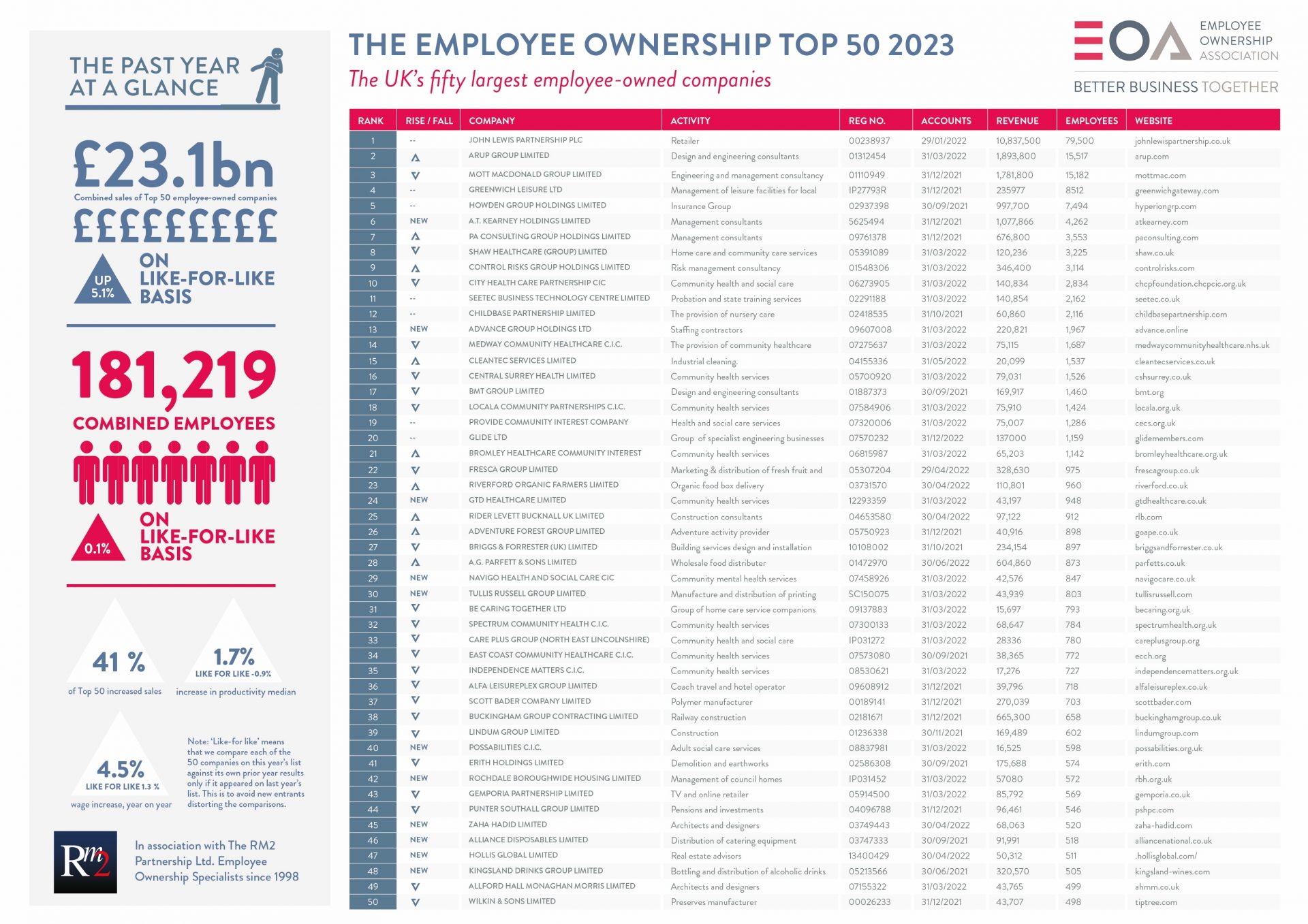Employee Ownership Top 50 2023
The UK’s 50 largest employee owned companies in 2023.
The Employee Ownership Top 50, originally created in 2014 by the late Nigel Mason, is a list of the largest 50 private employee-owned companies by number of employees in the UK.
RM2 is proudly continuing the research as part of Nigel’s legacy, and publishing it as normal in partnership with the Employee Ownership Association (EOA).
You can download the infographic by clicking the link below.
Key Facts for 2023
- There are eleven new entrants: A.T. Kearney Holdings Limited, Advance Group Holdings Limited, GTD Healthcare Limited, Navigo Health and Social Care CIC, Tullis Russell Group Limited, PossAbilities CIC, Rochdale Boroughwide Housing Limited, Zaha Hadid Limited, Alliance Disposables Limited, Hollis Global Limited and Kingsland Drinks Group Limited.
- Combined sales for the Top 50 is £23 billion, which is up 5.1% on a like-for-like basis.
- Total employees for the Top 50 is 181,219 which is holding steady from last year.
- The mean change in operating profit for the Top 50 is plus 6%.
- There has been an increase in median productivity, defined as value added per employee, of 1.7%.
- The minimum employee threshold for eligibility in the Top 50 has risen to 498 individuals, representing an increase from 433 employees in the previous year. This upward trend indicates a progression in the scale and size of companies included in the list. Notably, in 2014, when the Top 50 list was introduced, the minimum employee count stood at 143, underscoring the substantial growth experienced by employee-owned businesses over the years.
“Like for like” means that we compare each of the 50 companies on this year’s list against its own prior year results only if it appeared on last year’s list. This is to avoid new entrants distorting the comparisons.
Ground Rules
Criteria for inclusion: Companies must be incorporated in the UK as companies limited by shares, unquoted, independent and at least 25% owned by employees on a broad basis. Companies may have non-UK holding companies if the UK companies are operationally independent and the non-UK holding companies are at least 75% owned by employees. Shares from joint ventures and associate companies are excluded.
Criteria for exclusion: The list does not cover quoted companies, LLPs or partnerships. In businesses constituted as industrial and provident societies, companies limited by guarantee and community interest companies, employee ownership can be hard to ascertain from published sources so, in such cases, we have sometimes relied on a business’s membership of EOA as evidence of employee ownership.
Data collection: Several sources were used, including internet searches, lists of EOA members, Companies House searches and professional advisers active in the sector. Figures for employee numbers and revenues are taken from companies’ latest published annual accounts at Companies House. Estimates of the percentage of employee ownership in each company were sourced from the companies’ own websites or EOA or press reports, corroborated where possible from annual returns.
Disclaimer: Employee ownership data is not systematically published by companies so the list may not be accurate. Nominations for inclusion and corrections should be sent to operations@rm2.co.uk
Definition of terms: Operating profit or EBITDA is defined as earnings before interest, tax, depreciation and amortization. Productivity is defined as value added per employee. Value added is defined as EBITDA plus total wages. Debt is defined as the sum of bank loans and overdrafts, other short term finances and other long term finances minus cash.



